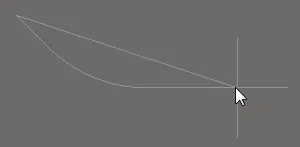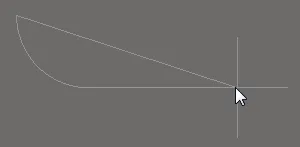Applied Parameters: Keepout=True|UpdateCaption=False
Summary
This command is used to place a Keepout Solid Region object onto the active document. A Keepout in PCB design is a user-defined area or perimeter placed in the layout that copper objects cannot intersect. Typically included to control the area used by automated copper placement actions, such as polygon pours and interactive routing, a Keepout also represents an invalid location when manually placing copper objects.
As specified ‘no go’ areas during design layout, Keepout objects use the existing Clearance Constraint Rules to control routing and detect placement violations, but unlike other placed objects, cannot be assigned to a Net and are not shown in generated Outputs or printouts. In its simplest sense, a Keepout acts as an ‘interference’ object that prevents other copper objects from intersecting its area as specified by the global Clearance Rule.
Access
This command is accessed from the PCB Editor and PCB Library Editor by:
- Choosing the Place » Keepout » Solid Region command from the main menus.
- Locating and using the Keepout Solid Region command (
 ) on the Active Bar.
) on the Active Bar.
If the command has been recently used from the Active Bar, it will become the active/visible button. Where other commands are available, this is indicated by a triangle at the bottom-right corner of the button. Click and hold on the active button to access a menu of all associated commands for that grouping.
- Right-clicking in the workspace then choosing the Place » Keepout » Solid Region command from the context menu (PCB Editor only).
Keepouts can be placed on all (copper) signal layers, excluding copper planes. When the currently active board layer is not compatible with Keepouts, the command is not available (grayed out).
Use
After launching the command, the cursor will change to a cross-hair and you will enter keepout solid region placement mode. Placement is made by performing the following sequence of actions:
- Position the cursor then click or press Enter to anchor the starting vertex for the keepout solid region.
- Move the cursor ready to place the second vertex. The default behavior is to place two edges with each click, with a user-defined corner shape between them. Refer to the Placement Modes section below for more details on changing corner modes.
- Continue to move the mouse then click or press Enter to place further vertices.
- After placing the final vertex, right-click or press Esc to close and complete placement of the keepout solid region. There is no need to manually close the keepout solid region since the software will automatically complete the shape by connecting the start point to the final point placed.
- Continue placing further keepout solid regions or right-click or press Esc to exit placement mode.
Press the
Tab key to access the
Properties panel, from where properties for the keepout solid region can be changed on-the-fly. Pressing
Tab pauses placement, allowing you to interact with the panel (or other area of the software) directly. To resume, click the pause symbol that appears over the workspace, or press
Esc.
Additional actions that can be performed during placement include:
- Press the + and - keys on the numeric keypad to cycle forward and backward through all layers currently visible in the design.
- Press the * key to cycle through the visible signal layers.
Placement Modes
While placing a keepout solid region there are five available corner modes, four of which also have corner direction sub-modes. During placement:
- Press Shift+Spacebar to cycle through the five available corner modes: 45 degree, 45 degree with arc, 90 degree, 90 degree with arc, and Any Angle.
- Press Spacebar to toggle between the two corner direction sub-modes.
- When in either of the arc corner modes, hold the
 or
or  keys to shrink or grow the arc. Hold the Shift key as you press to accelerate arc resizing.
keys to shrink or grow the arc. Hold the Shift key as you press to accelerate arc resizing.
- Press the 1 shortcut key to toggle between placing two edges per click, or one edge per click. In this second mode the dashed edge is referred to as the look-ahead segment (as shown in the last image in the set below).
- Press the Backspace key to remove the last vertex.





 Press Shift+Spacebar to cycle through the five available corner modes, press the 1 shortcut to toggle placement between
Press Shift+Spacebar to cycle through the five available corner modes, press the 1 shortcut to toggle placement between
two edges or one edge.
Tips
- To place an all-layer keepout, make the Keepout layer the active layer then place the keepout solid region on that layer. Alternatively, after placement, select the keepout solid region and set its Restricted for Layer field (in the Properties section of the Properties panel) to Keep-Out Layer. Keepouts are indicated by the current Keep-Out layer color. Keepout objects set to a specific signal layer are outlined by the Keep-Out color, whereas Keepouts on the Keep-Out Layer show as solid color.
- When editing the properties of the placed keepout solid region, the associated Keepout Restrictions options determine which object types will be restricted by the Keepout. Deselecting an object type will cause the Keepout to allow transgressions by that type of object (not kept out) by not imposing the applicable Clearance Rule.
- Keepouts are automatically restricted to the Layer on which they are placed, so Keepouts applied directly to the Keep-Out layer will become All Layer Keepouts. When the Keepout Layer is changed, the Keepout will be limited to and appear on the specified Layer. Note that a conventional (non Keepout) object cannot be placed on the Keep-Out Layer.
- While attributes can be modified during placement (Tab to bring up the Properties panel), keep in mind that these will become the default settings for further placement unless the Permanent option on the PCB Editor – Defaults page of the Preferences dialog is enabled. When this option is enabled, changes made will affect only the object being placed and subsequent objects placed during the same placement session.
